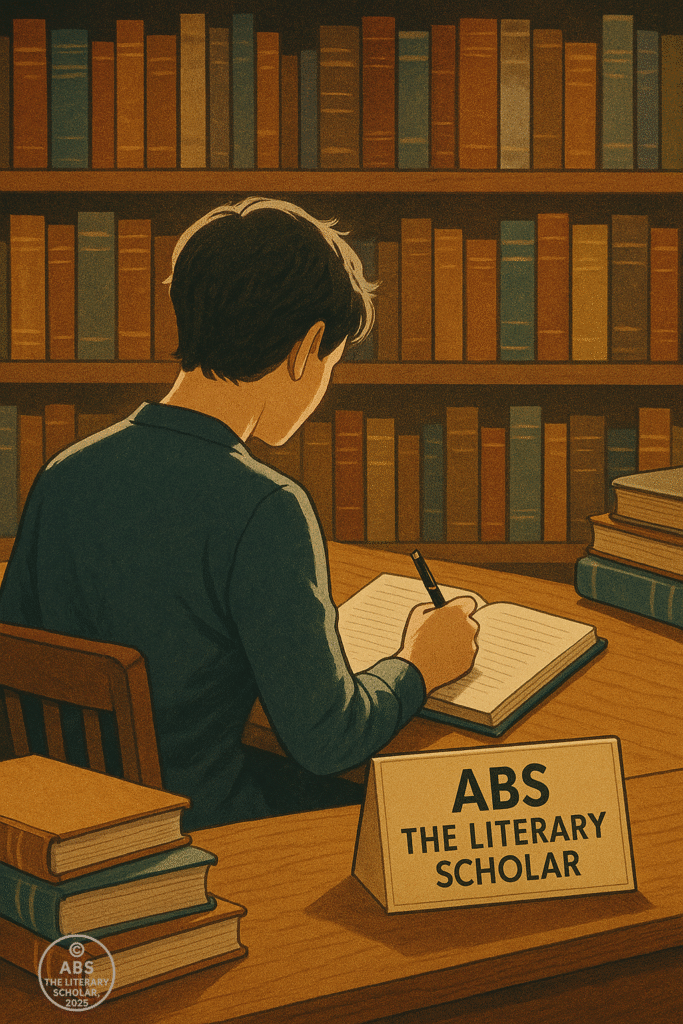ABOUT ABS, THE LITERARY SCHOLAR
Who is ABS, the Literary Scholar?
A question you may ask — and rightly so. For there is no photograph here, no biographical bullet points, no pronouns to define, no categories to contain. There is only a presence — felt deeply, remembered vividly, and spoken of with reverence. The Scholar — known simply by the initials ABS — is less a person and more a phenomenon. A mind steeped in literature, a heart soaked in verses, a soul that walks hand-in-hand with the greats — from Homer to Heaney, from the Beowulf bard to Toni Morrison, from Kalidasa to Kamala Das.
“Wherever there are words, the Scholar breathes.”
This Scholar has not merely taught — they’ve ignited. Thousands of students, once passive readers or hesitant minds, found themselves transformed. People who never turned a page found themselves drowning in pages they couldn’t put down. For ABS didn’t just teach literature — ABS made it live. A poem wasn’t a text to be studied; it was a window into time. A novel wasn’t a syllabus item; it was a portal to a world rebuilt word by word in the minds of those who listened. With voice and vision, ABS painted the literary landscape — so vividly that students didn’t just remember scenes, they felt the light in a Brontë morning, the storm in a Shakespearean night.
The Scholar never spoke from a pedestal. They walked among the learners — humble, human, yet unmistakably profound. There was no arrogance, only grace. No vanity, only clarity. The Scholar had that rare gift: the ability to step down without diminishing their stature, to speak simply without losing depth. They taught as if the soul of the text was whispering through them.
To witness ABS in a classroom was to witness poetry in motion — metaphor after metaphor, perspective after perspective, unfolding like petals from a long-closed bud. Every word carried weight, every pause had meaning. They didn’t just analyze literature — they felt it, translated it, embodied it.
British, American, African, Caribbean, Canadian, Australian, Indian — no literature was beyond their reach. From the haunting chants of Anglo-Saxon warriors to the defiant lyrics of postcolonial poets, from colonial prose to modernist fragmentation — every era, every movement, every culture found place in the Scholar’s mind. Their knowledge was a vast digital archive of zipped files — but once opened in discussion, it was like rain on dry earth: nourishing, necessary, unforgettable.
“The text is alive,” the Scholar would say,
“You just have to sit quietly enough to hear it breathe.”
So, who is the Scholar?
You may never know their face. But if you’ve ever learned how to truly read — to dig deeper, to feel more, to find the many meanings buried beneath a single line — perhaps, unknowingly, you’ve already met them.

Who is the Scholar?
A question you may ask — and rightly so. For there is no photograph here, no biographical bullet points, no pronouns to define, no categories to contain. There is only a presence — felt deeply, remembered vividly, and spoken of with reverence. The Scholar — known simply by the initials ABS — is less a person and more a phenomenon. A mind steeped in literature, a heart soaked in verses, a soul that walks hand-in-hand with the greats — from Homer to Heaney, from the Beowulf bard to Toni Morrison, from Kalidasa to Kamala Das.
“Wherever there are words, the Scholar breathes.”
This Scholar has not merely taught — they’ve ignited. Thousands of students, once passive readers or hesitant minds, found themselves transformed. People who never turned a page found themselves drowning in pages they couldn’t put down. For ABS didn’t just teach literature — ABS made it live. A poem wasn’t a text to be studied; it was a window into time. A novel wasn’t a syllabus item; it was a portal to a world rebuilt word by word in the minds of those who listened. With voice and vision, ABS painted the literary landscape — so vividly that students didn’t just remember scenes, they felt the light in a Brontë morning, the storm in a Shakespearean night.
The Scholar never spoke from a pedestal. They walked among the learners — humble, human, yet unmistakably profound. There was no arrogance, only grace. No vanity, only clarity. The Scholar had that rare gift: the ability to step down without diminishing their stature, to speak simply without losing depth. They taught as if the soul of the text was whispering through them.
To witness ABS in a classroom was to witness poetry in motion — metaphor after metaphor, perspective after perspective, unfolding like petals from a long-closed bud. Every word carried weight, every pause had meaning. They didn’t just analyze literature — they felt it, translated it, embodied it.
British, American, African, Caribbean, Canadian, Australian, Indian — no literature was beyond their reach. From the haunting chants of Anglo-Saxon warriors to the defiant lyrics of postcolonial poets, from colonial prose to modernist fragmentation — every era, every movement, every culture found place in the Scholar’s mind. Their knowledge was a vast digital archive of zipped files — but once opened in discussion, it was like rain on dry earth: nourishing, necessary, unforgettable.
“The text is alive,” the Scholar would say,
“You just have to sit quietly enough to hear it breathe.”
So, who is the Scholar?
You may never know their face. But if you’ve ever learned how to truly read — to dig deeper, to feel more, to find the many meanings buried beneath a single line — perhaps, unknowingly, you’ve already met them.
Share this page / Spread the witty word / Let the echo wander / Bookmark the brilliance
